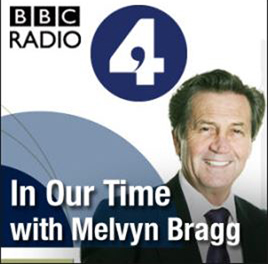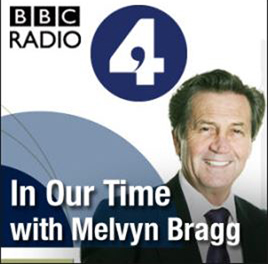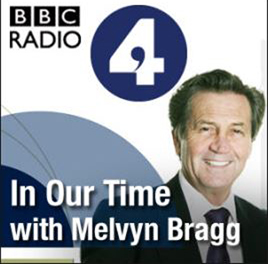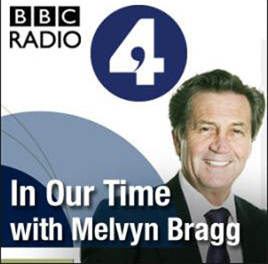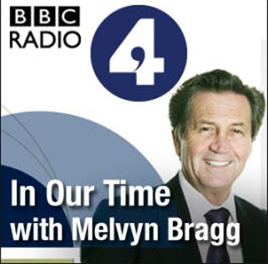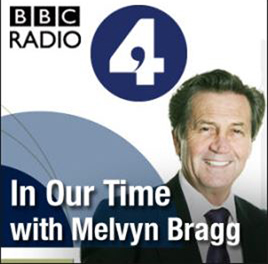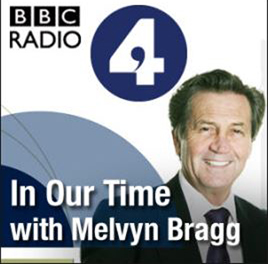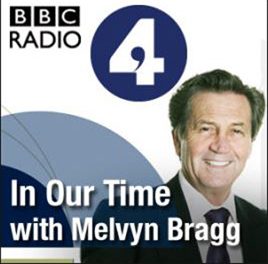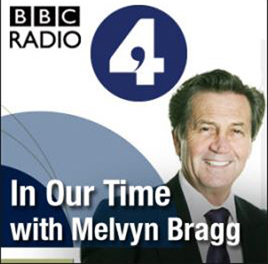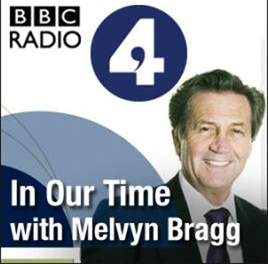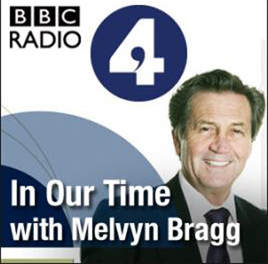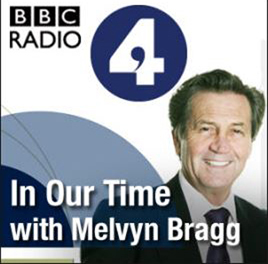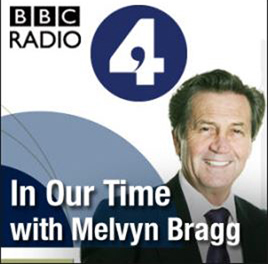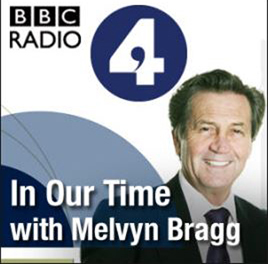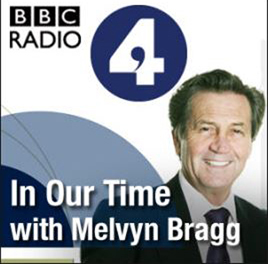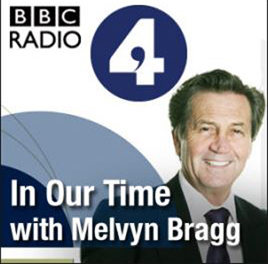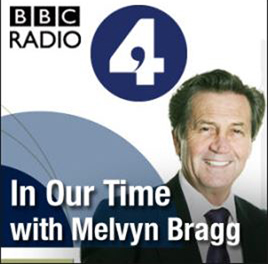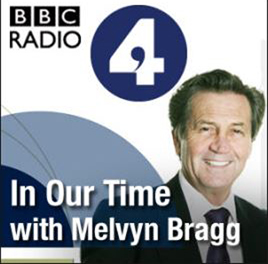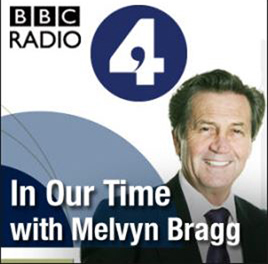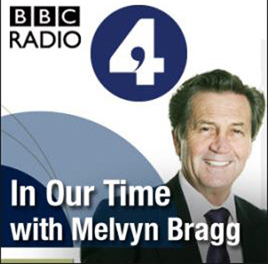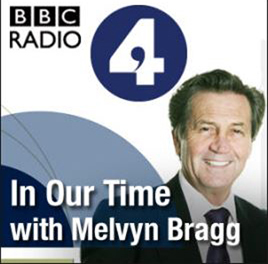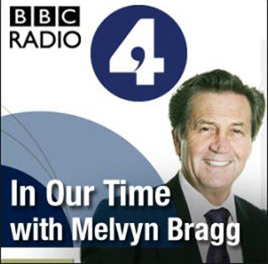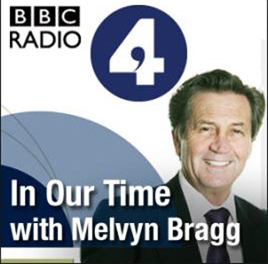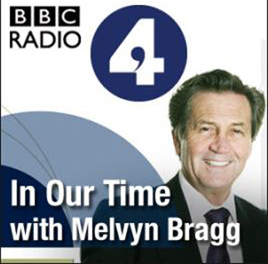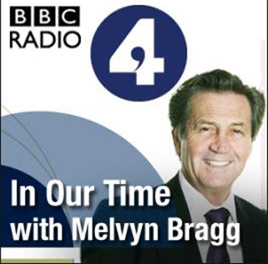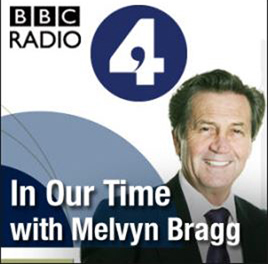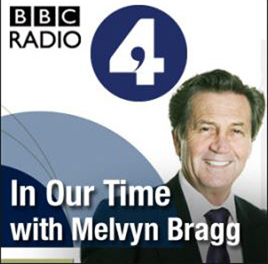Select one or more of these popular tags:
-
In Our Time - Good and Evil
-
Melvyn Bragg
With Leszek Kolakowski, author and Professor of Philosophy, Oxford University; Galen Strawson, author and Fellow and Tutor in Philosophy, Jesus College, Oxford.
With Leszek Kolakowski, author and Professor of Philosophy, Oxford University; Galen Strawson, author and Fellow and Tutor in Philosophy, Jesus College, Oxford.
-
In Our Time - Grand Unified Theory
-
Melvyn Bragg
Melvyn Bragg examines 20th century physics’ quest for the ultimate theory of everything.
Melvyn Bragg examines 20th century physics’ quest for the ultimate theory of everything.
-
In Our Time - Imagination and Consciousness
-
Melvyn Bragg
Melvyn Bragg and guests discuss the question of consciousness, our sense of self, and how we are able to imagine things when they are not there, which are problems that have troubled the great minds of philosophy for thousands of years.
Melvyn Bragg and guests discuss the question of consciousness, our sense of self, and how we are able to imagine things when they are not there, which are problems that have troubled the great minds of philosophy for thousands of years.
-
In Our Time - Information Technology
-
Melvyn Bragg
With Charles Leadbeater, Demos Research Associate and author of Living On Thin Air: The New Economy; Ian Angell, Professor of Information Systems, London School of Economics and author of The New Barbarian Manifesto: How to Survive the Information Age.
With Charles Leadbeater, Demos Research Associate and author of Living On Thin Air: The New Economy; Ian Angell, Professor of Information Systems, London School of Economics and author of The New Barbarian Manifesto: How to Survive the Information Age.
-
In Our Time - Intelligence
-
Melvyn Bragg
With Dr Ken Richardson, educational psychologist, former Senior Lecturer, Open University and author of The Making of Intelligence; Professor Michael Ruse Philosopher of Biology, University of Guelph, Ontario and author of Mystery of Mysteries: Is Evolution a Social Construction?
With Dr Ken Richardson, educational psychologist, former Senior Lecturer, Open University and author of The Making of Intelligence; Professor Michael Ruse Philosopher of Biology, University of Guelph, Ontario and author of Mystery of Mysteries: Is Evolution a Social Construction?
-
In Our Time - Language and the Mind
-
Melvyn Bragg
Melvyn Bragg and guests discuss the history of our ideas about the formation of language.
Melvyn Bragg and guests discuss the history of our ideas about the formation of language.
-
In Our Time - Laws of Nature
-
Melvyn Bragg
With Mark Buchanan, physicist and author of Ubiquity; Professor Frank Close, theoretical physicist and author of Lucifer’s Legacy: The Meaning of Asymmetry; Nancy Cartwright, Professor of Philosophy, LSE.
With Mark Buchanan, physicist and author of Ubiquity; Professor Frank Close, theoretical physicist and author of Lucifer’s Legacy: The Meaning of Asymmetry; Nancy Cartwright, Professor of Philosophy, LSE.
In The Prince, Machiavelli's great manual of power, he wrote, "since men love as they themselves determine but fear as their ruler determines, a wise prince must rely upon what he and not others can control". He also advised, "One must be a fox in order to recognise traps, and a lion to frighten off wolves. Those who simply act like lions are stupid. So it follows that a prudent ruler cannot, and must not, honour his word when it places him at a disadvantage". What times was Machiavelli living through to take such a brutal perspective on power? How did he gain the experience to provide this advice to rulers? And was he really the amoral, or even evil figure that so many have liked to paint him?
In The Prince, Machiavelli's great manual of power, he wrote, "since men love as they themselves determine but fear as their ruler determines, a wise prince must rely upon what he and not others can control". He also advised, "One must be a fox in order to recognise traps, and a lion to frighten off wolves. Those who simply act like lions are stupid. So it follows that a prudent ruler cannot, and must not, honour his word when it places him at a disadvantage". What times was Machiavelli living through to take such a brutal perspective on power? How did he gain the experience to provide this advice to rulers? And was he really the amoral, or even evil figure that so many have liked to paint him?
-
In Our Time - Materialism
-
Melvyn Bragg
What does materialism really mean, how has it developed over time and can we still have free will if we are living in a materialist world? Contributers include; Anthony Grayling, Professor of Philosophy at Birkbeck College, University of London;Caroline Warman, Fellow of Jesus College, Oxford and Anthony O’Hear, Professor of Philosophy at the University of Buckingham
What does materialism really mean, how has it developed over time and can we still have free will if we are living in a materialist world? Contributers include; Anthony Grayling, Professor of Philosophy at Birkbeck College, University of London;Caroline Warman, Fellow of Jesus College, Oxford and Anthony O’Hear, Professor of Philosophy at the University of Buckingham
-
In Our Time - Mathematics
-
Melvyn Bragg
With Ian Stewart, Professor of Mathematics and Gresham Professor of Geometry, University of Warwick; Brian Butterworth, Professor of Cognitive Neuroscience, University College, London.
With Ian Stewart, Professor of Mathematics and Gresham Professor of Geometry, University of Warwick; Brian Butterworth, Professor of Cognitive Neuroscience, University College, London.
-
In Our Time - Maths and Storytelling
-
Melvyn Bragg
With John Allen Paulos, Presidential Scholar of Mathematics, Temple University, Philadelphia and author of Once Upon a Number - The hidden mathematical logic of stories; Marina Warner, novelist, historian, critic, former Reith Lecturer and Visiting Professor at Birkbeck College, London.
With John Allen Paulos, Presidential Scholar of Mathematics, Temple University, Philadelphia and author of Once Upon a Number - The hidden mathematical logic of stories; Marina Warner, novelist, historian, critic, former Reith Lecturer and Visiting Professor at Birkbeck College, London.
-
In Our Time - Memory and Culture
-
Melvyn Bragg
With Professor Malcolm Bowie, Marshall Foch Professor of French Literature at Oxford University and Director of Oxford’s European Humanities Research Centre; Dr Nancy Wood, Chair of Media Studies, University of Sussex and author of Vectors of Memory.
With Professor Malcolm Bowie, Marshall Foch Professor of French Literature at Oxford University and Director of Oxford’s European Humanities Research Centre; Dr Nancy Wood, Chair of Media Studies, University of Sussex and author of Vectors of Memory.
-
In Our Time - Neuroscience
-
Melvyn Bragg
Neuroscience used to work – by examining the dead or investigating the damaged – but now things have changed. Imaging machines and other technologies enable us to see the active brain in everyday life, to observe the activation of its cells and the mass firing of its neuron batteries. But what picture of the brain has emerged, how has our understanding of it changed and what are the implications for understanding that most mysterious and significant of all phenomena – the human mind?
Neuroscience used to work – by examining the dead or investigating the damaged – but now things have changed. Imaging machines and other technologies enable us to see the active brain in everyday life, to observe the activation of its cells and the mass firing of its neuron batteries. But what picture of the brain has emerged, how has our understanding of it changed and what are the implications for understanding that most mysterious and significant of all phenomena – the human mind?
-
In Our Time - Neuroscience in the 20th century
-
Melvyn Bragg
With Professor Susan Greenfield, director of the Royal Institution, Professor of Pharmacology, Oxford University and Professor of Physics at Gresham College; Professor Vilayanur Ramachandran, Professor of Neuroscience and Psychology, Director of the Brain Perception Laboratory, University of California in San Diego and Professor at the Salk Institute.
With Professor Susan Greenfield, director of the Royal Institution, Professor of Pharmacology, Oxford University and Professor of Physics at Gresham College; Professor Vilayanur Ramachandran, Professor of Neuroscience and Psychology, Director of the Brain Perception Laboratory, University of California in San Diego and Professor at the Salk Institute.
-
In Our Time - Newton's Laws Of Motion
-
Melvyn Bragg
These are the three laws of motion with which Newton founded the discipline of classical mechanics and conjoined a series of concepts - inertia, acceleration, force, momentum and mass - by which we still describe the movement of things today. Newton’s laws have been refined over the years – most famously by Einstein - but they were still good enough, 282 years after they were published, to put Neil Armstrong on the Moon.
These are the three laws of motion with which Newton founded the discipline of classical mechanics and conjoined a series of concepts - inertia, acceleration, force, momentum and mass - by which we still describe the movement of things today. Newton’s laws have been refined over the years – most famously by Einstein - but they were still good enough, 282 years after they were published, to put Neil Armstrong on the Moon.
-
In Our Time - Nuclear Physics
-
Melvyn Bragg
With Jim Al-Khalili, Senior Lecturer in Physics at the University of Surrey; Christine Sutton, Particle Physicist and Lecturer in Physics at St Catherine’s College Oxford; John Gribbin, Visiting Fellow in Astronomy at the University of Sussex.
With Jim Al-Khalili, Senior Lecturer in Physics at the University of Surrey; Christine Sutton, Particle Physicist and Lecturer in Physics at St Catherine’s College Oxford; John Gribbin, Visiting Fellow in Astronomy at the University of Sussex.
-
In Our Time - Oceanography
-
Melvyn Bragg
With Margaret Deacon, visiting Research Fellow at Southampton Oceanography Centre and author of Scientists and the Sea, Tony Rice, Biological Oceanographer and author of Deep Ocean, Simon Schaffer, Reader in History and Philosophy of Science at the University of Cambridge, and a fellow of Darwin College.
With Margaret Deacon, visiting Research Fellow at Southampton Oceanography Centre and author of Scientists and the Sea, Tony Rice, Biological Oceanographer and author of Deep Ocean, Simon Schaffer, Reader in History and Philosophy of Science at the University of Cambridge, and a fellow of Darwin College.
-
In Our Time - Pain
-
Melvyn Bragg
With Patrick Wall, Professor of Physiology at St Thomas’ Hospital, London and author of Pain: The Science of Suffering; Semir Zeki, Professor of Neurobiology at University College, London.
With Patrick Wall, Professor of Physiology at St Thomas’ Hospital, London and author of Pain: The Science of Suffering; Semir Zeki, Professor of Neurobiology at University College, London.
-
In Our Time - Politics in the 20th Century
-
Melvyn Bragg
With Gore Vidal, American writer, commentator and author of The Smithsonian Institution; Alan Clarke, historian, politician and author of The Tories: Conservatives and the Nation State, 1922-97.
With Gore Vidal, American writer, commentator and author of The Smithsonian Institution; Alan Clarke, historian, politician and author of The Tories: Conservatives and the Nation State, 1922-97.
-
In Our Time - Prayer
-
Melvyn Bragg
With Professor Russell Stannard, physicist, religious writer and author of The God Experiment; Andrew Samuels, Jungian analyst and Professor of Analytical Psychology, University of Essex.
With Professor Russell Stannard, physicist, religious writer and author of The God Experiment; Andrew Samuels, Jungian analyst and Professor of Analytical Psychology, University of Essex.
-
In Our Time - Probability
-
Melvyn Bragg
Melvyn Bragg explores the mathematical concept of probability with his three guests: Marcus du Sautoy, Professor of Mathematics at the University of Oxford; Colva Roney-Dougal, Lecturer in Pure Mathematics at the University of St Andrews; and Ian Stewart, Professor of Mathematics at the University of Warwick
Melvyn Bragg explores the mathematical concept of probability with his three guests: Marcus du Sautoy, Professor of Mathematics at the University of Oxford; Colva Roney-Dougal, Lecturer in Pure Mathematics at the University of St Andrews; and Ian Stewart, Professor of Mathematics at the University of Warwick
-
In Our Time - Progress
-
Melvyn Bragg
Melvyn Bragg and guests discuss progress. As man has grown in years and knowledge, has he also progressed in terms of happiness and a true understanding of the human condition?
Melvyn Bragg and guests discuss progress. As man has grown in years and knowledge, has he also progressed in terms of happiness and a true understanding of the human condition?
-
In Our Time - Psychoanalysis and its Legacy
-
Melvyn Bragg
With Dr Juliet Mitchell, psychoanalyst, Fellow of Jesus College, Cambridge, Department of Political and Social Sciences; Adam Phillips, psychoanalyst and author of The Beast in the Nursery.
With Dr Juliet Mitchell, psychoanalyst, Fellow of Jesus College, Cambridge, Department of Political and Social Sciences; Adam Phillips, psychoanalyst and author of The Beast in the Nursery.
-
In Our Time - Quantum Gravity
-
Melvyn Bragg
With Dr John Gribbin, Visiting Fellow in Astronomy, University of Sussex; Lee Smolin, Professor of Physics, Centre for Gravitational Physics and Geometry, Pennsylvania State University and Visiting Professor of Physics at Imperial College, London; Dr Janna Levin, Advanced Fellow, Department of Applied Mathematics and Theoretical Physics, Cambridge University.
With Dr John Gribbin, Visiting Fellow in Astronomy, University of Sussex; Lee Smolin, Professor of Physics, Centre for Gravitational Physics and Geometry, Pennsylvania State University and Visiting Professor of Physics at Imperial College, London; Dr Janna Levin, Advanced Fellow, Department of Applied Mathematics and Theoretical Physics, Cambridge University.
-
In Our Time - Roman Britain
-
Melvyn Bragg
About 2000 years ago, Tacitus noted that “the climate is wretched”, Herodian said, “the atmosphere in the country is always gloomy”, Dio said “they live in tents unclothed and unshod, and share their women” and the historian Strabo said on no account should the Romans make it part of the Empire because it will never pay its way. But invade they did, and Britain became part of the Roman Empire for almost four hundred years But what brought Romans to Britain and what made them stay? Did they prove the commentators wrong and make Britain amount to something in the Empire? Did the Romans come and go without much trace, or do those four centuries still colour our national life and character today?
About 2000 years ago, Tacitus noted that “the climate is wretched”, Herodian said, “the atmosphere in the country is always gloomy”, Dio said “they live in tents unclothed and unshod, and share their women” and the historian Strabo said on no account should the Romans make it part of the Empire because it will never pay its way. But invade they did, and Britain became part of the Roman Empire for almost four hundred years But what brought Romans to Britain and what made them stay? Did they prove the commentators wrong and make Britain amount to something in the Empire? Did the Romans come and go without much trace, or do those four centuries still colour our national life and character today?
-
In Our Time - Science and Religion
-
Melvyn Bragg
Melvyn Bragg and guests discuss the areas of conflict and agreement between science and religion.
Melvyn Bragg and guests discuss the areas of conflict and agreement between science and religion.
-
In Our Time - Science in the 20th Century
-
Melvyn Bragg
Melvyn Bragg and guests discuss how perceptions of science and the power of science have changed in the 20th century.
Melvyn Bragg and guests discuss how perceptions of science and the power of science have changed in the 20th century.
-
In Our Time - Science's Revelations
-
Melvyn Bragg
With Richard Dawkins evolutionary biologist, reader in Zoology and Fellow of New College, Oxford, Charles Simonyi Chair of Public Understanding of Science, Oxford University and author of Unweaving The Rainbow: Science, Delusion and The Appetite For Wonder; Ian McEwan, novelist, and author of the Booker prize winning novel Amsterdam.
With Richard Dawkins evolutionary biologist, reader in Zoology and Fellow of New College, Oxford, Charles Simonyi Chair of Public Understanding of Science, Oxford University and author of Unweaving The Rainbow: Science, Delusion and The Appetite For Wonder; Ian McEwan, novelist, and author of the Booker prize winning novel Amsterdam.
-
In Our Time - Seventeenth Century Print Culture
-
Melvyn Bragg
"Away ungodly Vulgars, far away, Fly ye profane, that dare not view the day, Nor speak to men but shadows, nor would hear Of any news, but what seditious were, Hateful and harmful and ever to the best, Whispering their scandals ... " In 1614 the poet and playwright George Chapman poured scorn on the popular appetite for printed news. However, his initial scorn did not stop him from turning his pen to satisfy the public's new found appetite for scandal.
"Away ungodly Vulgars, far away, Fly ye profane, that dare not view the day, Nor speak to men but shadows, nor would hear Of any news, but what seditious were, Hateful and harmful and ever to the best, Whispering their scandals ... " In 1614 the poet and playwright George Chapman poured scorn on the popular appetite for printed news. However, his initial scorn did not stop him from turning his pen to satisfy the public's new found appetite for scandal.
-
In Our Time - Slavery and empire
-
Melvyn Bragg
Slavery and empire are two themes that run right through this country’s history. Britain’s imperial project dominated at least the last three centuries of our national life. Its advocates claim it was a civilising mission by which Britain spread enlightenment and improvement across the globe. Opponents have long seen it as a brutal business, with Britons cast as cruel oppressors out to exploit a conquered world. Is our imperial history so clear cut? What if Britons were themselves captives, either as prisoners of an imperial enterprise that sucked them in, generation after generation or, in some startling cases, as slaves to foreign peoples? Is slavery an inevitable part of empire: does it come with the territory? And how did Britain finally shake it off?
Slavery and empire are two themes that run right through this country’s history. Britain’s imperial project dominated at least the last three centuries of our national life. Its advocates claim it was a civilising mission by which Britain spread enlightenment and improvement across the globe. Opponents have long seen it as a brutal business, with Britons cast as cruel oppressors out to exploit a conquered world. Is our imperial history so clear cut? What if Britons were themselves captives, either as prisoners of an imperial enterprise that sucked them in, generation after generation or, in some startling cases, as slaves to foreign peoples? Is slavery an inevitable part of empire: does it come with the territory? And how did Britain finally shake it off?

